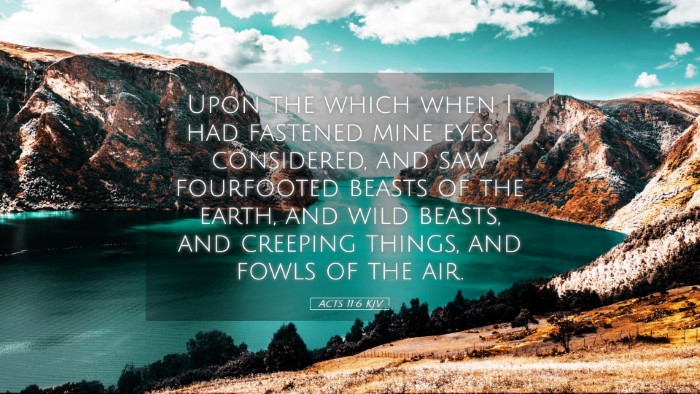Commentary on Acts 11:6
Introduction
Acts 11:6 is a pivotal verse in the New Testament that reveals significant truths about the early Church and God's inclusive plan for salvation. In this commentary, we explore insights from various public domain sources, examining the theological implications and practical applications of this verse.
Verse Context
Acts 11:6 states, “When I looked closely and considered it, I saw four-footed animals of the earth, wild beasts, reptiles, and birds of the air.” This verse comes from the account of Peter's vision, which was a transformative moment in the expansion of the Gospel to the Gentiles.
Matthew Henry's Commentary
Peter's Vision
Matthew Henry emphasizes the profound nature of Peter's vision. He notes that it symbolizes the breaking down of the barriers that divided Jews from Gentiles. The creatures, representing unclean animals, indicate that God was preparing Peter to accept Gentiles into the fold of believers.
Spiritual Insights
Henry points out that Peter's struggle with the vision illustrates the internal conflict in accepting new revelations from God. He argues that this represents a larger theme of transformation within the Church and the necessity of divine instruction in overcoming prejudice.
Albert Barnes' Notes
Understanding the Vision
Albert Barnes contextualizes this passage by highlighting the historical significance of animals being considered clean or unclean according to Jewish law. Barnes notes that the inclusion of all types of creatures is a representation of God's overarching plan for all humanity.
Divine Revelation
Barnes also discusses how this vision serves as a key moment of revelation. He emphasizes that it was crucial for Peter, as a leader, to receive this divine message, which would enable him to facilitate the spread of the Gospel beyond traditional boundaries.
Adam Clarke's Commentary
Theological Implication
Adam Clarke elaborates on the theological implications of God's command to Peter regarding clean and unclean animals. He argues that the vision signifies God's grace that transcends the law, illustrating the move from a covenantal relationship based solely on ethnicity to one that includes all through faith in Christ.
Practical Application
Clarke encourages believers to recognize their biases and preconceptions that might hinder the acceptance of others into the faith community. He stresses that God's love is universal and that Christians must embody this inclusivity in their outreach efforts.
Thematic Considerations
God's Redemptive Plan
Beyond mere interpretation, Acts 11:6 speaks volumes about God's redemptive plan for humanity. It showcases the transition from a Jewish-centric gospel to one that encompasses all religions and nations. The vision serves as a reassurance of God's commitment to inclusivity.
Prejudice and Acceptance
This verse prompts introspection among church leaders and congregations regarding their biases. The early Church faced significant challenges in accepting Gentiles, requiring a fresh understanding of grace that is applicable today.
Conclusion
Acts 11:6 serves as a profound reminder of God's call to broaden our understanding of the Gospel. The insights drawn from Matthew Henry, Albert Barnes, and Adam Clarke provide a rich tapestry of meaning that challenges believers to overcome prejudices and embrace the fullness of God's grace toward all people.


